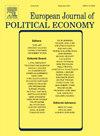Strategic interdependence in sovereign lending
IF 2.4
3区 经济学
Q2 ECONOMICS
引用次数: 0
Abstract
Government-to-government loans are powerful instruments of influence, but how do creditor governments decide whom to lend to? We argue that these decisions are shaped by the lending behavior of third-party creditors, as governments strategically allocate loans to maximize their geopolitical influence. Specifically, creditors observe and respond to third-party lending patterns, using these signals to guide their own choices. Crucially, the identity of these third-party creditors matters: rather than engaging directly with rivals, creditors tend to specialize and cooperate within their partnerships. We introduce and empirically test network effects in sovereign lending, showing that lending follows a pattern of conditional preferential attachment. Creditors are more likely to extend loans to recipients supported by their political partners than to recipients supported by adversaries. Consequently, although lending competition is not easily visible in aggregate data, lending patterns reveal a fragmentation into politically aligned creditor blocs. Our inferential network models provide strong evidence of this dynamic, demonstrating that governments’ perceptions of a recipient’s strategic value are shaped by the actions of other lenders. By incorporating this strategic interdependence, our analysis significantly improves the prediction of which governments receive loans and from whom.
主权贷款中的战略相互依赖
政府间贷款是强大的影响力工具,但债权国政府如何决定向谁放贷?我们认为,这些决策是由第三方债权人的贷款行为塑造的,因为政府战略性地分配贷款以最大化其地缘政治影响力。具体来说,债权人观察并回应第三方借贷模式,利用这些信号来指导自己的选择。至关重要的是,这些第三方债权人的身份很重要:与其直接与竞争对手打交道,债权人倾向于专业化,并在合作伙伴关系中进行合作。我们引入并实证检验了主权贷款中的网络效应,表明贷款遵循有条件的优先依附模式。债权人更有可能向其政治伙伴支持的接受国提供贷款,而不是向对手支持的接受国提供贷款。因此,尽管贷款竞争不容易从总体数据中看到,但贷款模式显示出政治上结盟的债权人集团的分裂。我们的推理网络模型为这一动态提供了强有力的证据,表明政府对接受国战略价值的看法是由其他贷款人的行为所塑造的。通过纳入这种战略上的相互依存关系,我们的分析大大改善了对哪些政府获得贷款以及从谁那里获得贷款的预测。
本文章由计算机程序翻译,如有差异,请以英文原文为准。
求助全文
约1分钟内获得全文
求助全文
来源期刊

European Journal of Political Economy
Multiple-
CiteScore
3.40
自引率
10.00%
发文量
106
期刊介绍:
The aim of the European Journal of Political Economy is to disseminate original theoretical and empirical research on economic phenomena within a scope that encompasses collective decision making, political behavior, and the role of institutions. Contributions are invited from the international community of researchers. Manuscripts must be published in English. Starting 2008, the European Journal of Political Economy is indexed in the Social Sciences Citation Index published by Thomson Scientific (formerly ISI).
 求助内容:
求助内容: 应助结果提醒方式:
应助结果提醒方式:


